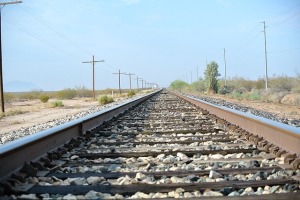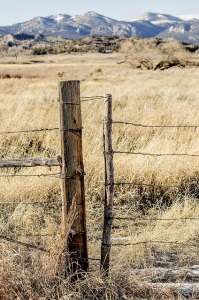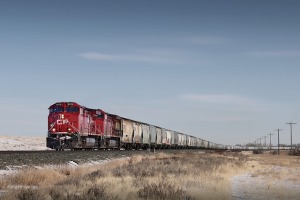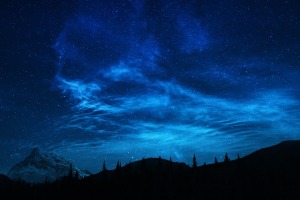Anyone who knew what we were planning said, “You’re crazy.” They said, “You’ll come face to face with evil in the form of men whose death would improve the world, men out there who are too evil to live in society. They live by rules you have no knowledge of. They will slit your throats for your shoes.”
After we graduated from high school my good friend Nick and I–age seventeen–decided to do something we had never done before nor had known anyone who had. We would ride freight trains across America for half a year before we started college. People told us that we shouldn’t. We were just boys.
We spent six months hitchhiking and “ridin the rails,” a life that is alien to the more secure lives of stock brokers, school teachers, social workers, demographers, meteorologists, and the like that I thought was worth writing about so there would be a record of that unique way of life.

Running Along the Tracks
How free I feel though far from my home
Along railroad tracks on a hot June day
With a knapsack bouncing on my back,
The chink, chink, chink, chink
Of crushed stones and coal cinders
Under the soles of my scuffed boots as I sprint,
Laughing with my buddy.
Setting Out
Nothing in this world will burden me.
Fields of crops out to the horizon.
Breathing in winds that rejuvenate like milk.
Waving to hikers come out from the city. We aim
To jump off this train a thousand miles away.
A Savory Dinner
Sitting cross-legged, face to face like diplomats or friends,
Backpacks for tables, water from canteens,
We dine on ham on bread with caraway seeds.
Full Throttle
We were really moving now, the hot wind raging in through the two open doors, but outside the box car not a leaf was moving. Birds sailed this way and that in the gossamer sky, grasshoppers chirped and leaped along the tracks, and butterflies, their wings outspread and fluttering, darted among the bushes. One of the butterflies flew into the car, explored a bit, found that our company wasn’t to its liking, then flew back out while in the background a scarecrow was out in a field together with a cluster of flitting blue jays and surrounded by mist. Then the ground rose to overlook a meadow resplendent with white wild flowers.
Hobos in a Clearing
We reach the crest of a hill at dusk.
Below us, like the camps of infantry,
Burn the scattered fires of forgotten men,
Each a separate picture.
They live in the open or in
The opulence of tarpaper lean-tos against a tree,
And migrate as punctually as geese.
They wear black–perhaps it is the soot of freight trains–
And squat on their haunches like crickets
Beside the snapping flames.
Streams of smoke trail off high into the trees
And embers flicker and fade, flicker and fade
In the harsh bite and sparkle of the wind,
And glow bronze on the men’s untroubled faces
Late into the night.
Knife Fight
Overcast this morning.
When we were looking for a box car to board
We saw dead beetles floating on a puddle.
And then we saw three men lying against a log.
When we were close to the men the big one
On the right asked if we had any money.
I said no. He asked if I was sure and I said I was.
I saw that the one in the middle had a newspaper
Wrapped around his arm.
The newspaper was drenched with blood.
The man’s skin was gray, his limp eyes were
Sunken into his head, and he looked weak.
The man on the left said,
Do you want to see something?’”
And reached over and took off the newspaper.
The man’s bloody arm had a deep, three-inch wide
Gash from the crook of his arm down to his wrist.
I went closer and could see the inside of his
Arm very clearly–red, blue, purple, gristly, and white.
His eyes were dull and without luster.
Blood trickled out of his wound and dripped in the dirt.
The man on the right said,
“He was in a knife fight and the guy cut him up.
It’s pretty bad, huh?”
“It’s very bad,” I said. “You have to get him to a doctor.”
“Think so?” the man on the left said.
“We’re in the middle of nowhere,” the man on the right said.
On either side of the track were a fresh-smelling
Forest of oaks and pines and a broad stream
Running through it. We hadn’t seen buildings
For two hours on the train and there was nothing there.
“Go up front and tell the engineer that
You’ve got a dying man here and you’ve got
To get him to a doctor right away.” I said.
The dying man said, “Don’t bother,”
And closed his eyes.
Later, on the train Nick said,
“I guess he’s going to die.”
“Yes, he’ll die all right,” I said.
“He’ll bleed to death right there.”
His eyes would blur over with death
And his breath seep out,
And his associates would gaze on
With wonder as strange as dreams.
Girl for Sale
In a train yard one morning
A man approached with a girl
My younger sister’s age
Wearing a yellow sun dress,
Frail, her limbs just bones.
“You can have her for twenty dollars.”
“What?”
“You can buy this girl for twenty dollars.”
No sale, he continued down the track,
The shy girl following dutifully.
Milk
 The train hadn’t stopped
The train hadn’t stopped
For a long time, and our canteens
Were empty.
We’d never been as thirsty.
I fell asleep in the heat and dreamed
That I opened the refrigerator
At home and saw every shelf loaded
With bottles of milk.
Then in a second dream
I saw waterfalls of milk spraying
And roaring down like Victoria Falls–
Streams of milk, rivers of milk–
An ocean of cold milk. Nick asked if I was
Awake and I said I was.
“What are you thinking about?” he asked.
“Milk.”
“Milk?”
“Milk.”
Ice Cold Nights in Box Cars
On cold nights we paced back and forth,
From end to end, side to side,
Stamped our feet, pressed ourselves against the walls,
Rubbed the circulation into our hands, and
Flapped our arms against our bodies for warmth.
In the Company of the Most Beautiful Girl
We stopped for coffee one night in a little café up in North Platte, Nebraska. Outside it was cold and gray. We went inside, out of the rain, and sat at the counter and waited. In a few minutes we saw the kitchen door swing open and a waitress about our age came out. She poured our coffee carefully, biting her lower lip, her finger on the top of the pot, not looking at us, and our eyes large, we watched her closely. She had long, lovely-shaded hair that flowed like oil and tossed from side to side. She smiled so gently, so exquisitely, that I was numb. It was my opinion that she was the most beautiful girl we would ever see in our lives and Nick agreed. We stayed as long as we could just to look at her and be around her. When we paid up and left at closing time we said goodbye to her, regretting we would never see her again, and she blushed and smiled at us in a friendly way, her eyes very bright. We were warmed by the sincerity with which she said, “Good luck, boys.” The thought of her made us happy for a long time.
What You See and Hear Along a Siding On a Rainy Night
 In the distant moon’s quiet light
In the distant moon’s quiet light
Shadows of elegant birches
Are silk patches lying lightly
On the surface of puddles.
The chatter of fidgety locusts in the grass
Is gossip of talkative neighbors.
Arrayed along this siding are cars stenciled
Santa Fe, Illinois Central, Southern Pacific,
Northern Pacific, Union Pacific, Central Pacific,
The Soo Line, and B&O.
In a warm and refreshing wind
Whispering up from the south
You can hear
The booming midnight clash of freight cars coupling and uncoupling,
The heavy huff of released steam from brakes,
The languid breathing of engines cooling
As though they are falling asleep,
The muted voices of gaunt men stepping out of darkness,
Carrying oil cans with long necks, and swinging
With ease and grace, yellow-glowing lanterns,
Setting signals, and calling to each other in a garbled language
That we have no hope of understanding.
I may be wrong, but I think this is Montana.
Shot at, Chased By Dogs
When our freight train reached Kelso-Longview
The railroad police were waiting,
Holding the leash of a German shepherd
In one hand, waving a gun in the other.
Shouting and running, we youngest, running fastest,
Hobos leaped or fell from the cars and dashed
In every direction, chased by the cops.
As Nick and I ran we laughed at how out
Of our element we were and how ludicrous
The whole scene must appear–a hundred
Running hobos and bulls, men firing revolvers,
Other men praying not to be shot,
Ferocious dogs snapping at our heels.
Cherry Pickers
Cold, we stand at a curb in darkness at four in the morning
With a group of half-drunk, miserably poor, but good-hearted
Homeless men–day laborers–the Yakima sun too fierce
To work past noon. The boss hits Nick and me on the shoulder
With a rolled magazine. We look strong. We will work today, and
Everyone who works will be paid twenty-five cents a pail.
We are hauled out to the orchards under a tarp in a truck
Past rows of ramshackle abandoned houses with no
Windows and open front doors hanging from their hinges.
Everyone is in a good mood. Comrades now, we joke that the
Driver doesn’t know where the hell he’s going:
“Hey, he’s taking us to Walla-Walla.”
(A chorus of laughter shakes the truck.)
Working in a thick silence as though mute,
Clans of indefatigable
Migrant workers from Texas–
Old men, old women, young men, young
Women, children sweep the orchards clean
Like locusts with nimble fingers.
Love in a Parking Lot
Old cars with dented fenders and gaudy garters dangling on their rear-view mirrors, and pick-up trucks with rifle racks cradling shotguns and carbines were parked four deep in the lot. When the door of the Inn swung open, muscle-bound men, their shirt sleeves rolled up above the bicep, sauntered out, their arms tight around the waists of conspicuously made-up women, their heads thrown back in exaltation and abandon, and the chime of laughter spilled into the night like flowing wine.
On a Flat Car of a Freight Train Crossing the Great Salt Lake Desert Late at Night
Cold settles savagely on the
Great Salt Lake desert late at night.
When we reached it after a long, lazy day,
The massive red sun pulsating in the sky
Like a throbbing heart,
The temperature fell precipitously.
There would be a frost.
Then in the great, black,
Brooding mass of night,
The wind of the fast-moving train
Became a wall of icy air coming straight at us,
Death seeking to lay hold of us,
The frost to murder us, growing colder.
Colder, we in shirt sleeves.
You wanted to scream; you wanted
Someone to end this pain, to come
To your aid, to save you, to be merciful.
You prayed the train would fly off the
Track so it would have to stop
The merciless cold wind.
You wished to beg some power to
Lift you off this little island of misery
Where you knew without doubt you
Might die before the sun rose.
I had it in my mind that were
We to sleep we would never
Wake again, like mountain climbers
Dying on glaciers, so I shouted-
-La, la, la, tra-la, la, la–that
I thought would keep us awake.
I thought: “If I am about to die,
If am about to die,
If I am about to die
Why must it be as my life is beginning?
Why couldn’t death wait twenty
Or thirty years? What’s the hurry?
What is to be gained by killing a boy?”
Craning my neck I looked up
And saw the high twinkling stars.
I thought then that as long as I lived
I would never forget how beautiful they had been.
My thoughts flew like sparrows,
Repeating, “Tomorrow will be better,
Tomorrow will be warm, tomorrow
I will be out of it, and I will never have to
Come back to this place again.” And all the while
The sky was sublime: the orange glow of sunset,
The blue glow of evening; the white glow of the moon.
Eight Stalking Wolves
I point my finger and call to my friend:
“There, there up on the slope above us,
There, to the left, in those trees.”
Eight stalking wolves coming down
The mountain slowly, like liquid
Through a drizzle of large, wet snowflakes
In single file. A fawn has strayed from the herd.
.As the herd moves en masse, the wolves
Streak to the fawn through evergreens
And blue spruces, the wind blowing their tails,
Circling, wheeling, teasing, and tormenting the fawn,
Burrowing their snouts playfully in the snow.
Barks and cries echo through the canyons.
We shout and wildly wave our arms.
They stop. Every sound, every muscle,
Every movement ceases, their ears perk.
But they know that we are not hunters.
They have no fear of us. Their yellow eyes glisten.
As we leave the mountain the contours and the dim colors
Of the slopes, the sky, and the trees become beautiful.
So placid, so sublime, the radiance of the moon.
The Flanks of Tall Mountains
The flanks of tall mountains are abundant with gray shale
Slipping from higher elevations and lying like the rubble
Of fallen pillars of ancient kingdoms and battlefield dead.
On windy days and nights the air hisses in lofty evergreens
Slanting off mountains, furtive sounds everywhere.
Always vast distances lie wherever we look.
The lumpy hills of Sun Valley, with red-brown and
Black shadows spread like blankets, rise and gently dip.
Occasionally in the pall of night, here and there,
As though to frighten us, appears an unexplained light
Through the darkness, mysterious and indifferent.

© 2023 David J. Rogers
For my interview from the international teleconference with Ben Dean about Fighting to Win, click the following link:
Order Fighting to Win: Samurai Techniques for Your Work and Life eBook by David J. Rogers
or
Order Waging Business Warfare: Lessons From the Military Masters in Achieving Competitive Superiority
or

